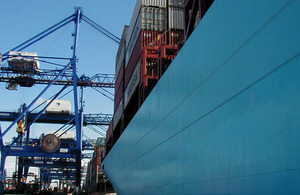Government backs innovative technology to slash shipping emissions to zero
Government commits to help fund innovative technologies and fuels to reduce maritime emissions, and help create a zero-emissions sector.

The government has committed to help fund innovative technologies and fuels to reduce maritime emissions, ultimately helping create a zero-emissions sector.
The government, in partnership with industry, has committed to spending over £6 million on funding trials of innovative energy saving devices, such as:
- state of the art propellers
- on board waste heat recovery
- rotor sails that use wind power to cut fuel consumption
In addition to funding trials, we are also now providing technical backing and expertise through the Maritime and Coastguard Agency for the following projects:
- work in Scotland to prove the use of hydrogen fuel cells for ferries in the UK
- Caledonian MacBrayne Ferries ongoing work to deliver innovative vessels such as hybrids, and their longer term efforts to prove the use of innovative propulsion and fuels for the next generation of ferries
The UK is playing a leading role in implementing binding energy efficiency targets for shipping, which we helped secure global agreement on in 2011. By 2025, the majority of new ships will be expected to be 30% more efficient than current designs.
Maritime transport emits around 1,000 million tonnes of CO₂ annually worldwide, and is responsible for about 2.5% of global greenhouse gas emissions. If emissions from international shipping are not addressed, studies suggest they will account for almost a fifth (17%) of global emissions by 2050, highlighting the need for urgent action.
Speaking in the run up to London International Shipping Week 2017, Maritime Minister John Hayes said:
The UK is home to a wealth of expertise in maritime technology, but more needs to be done to move this sector towards a zero emissions world.
That’s why this government is committed to backing vital technology to meet this goal, and we are looking to deepen our technical expertise to further support industry.
I will relay this message during London International Shipping Week 2017, where we will showcase the UK’s exciting future as a powerhouse of maritime innovation.
The government has also been working closely with industry to develop international regulations to support liquid natural gas and other alternative fuels. Vessels fuelled with liquid natural gas are regularly refuelling in the UK at ports including Teesport, Southampton and Immingham.
The UK already has several hybrid ships operating in its waters. These systems offer local air quality benefits, can be quieter for port communities and provide opportunities for further energy efficiency on board a vessel.
Maritime media enquiries
Media enquiries 0300 7777 878
Switchboard 0300 330 3000